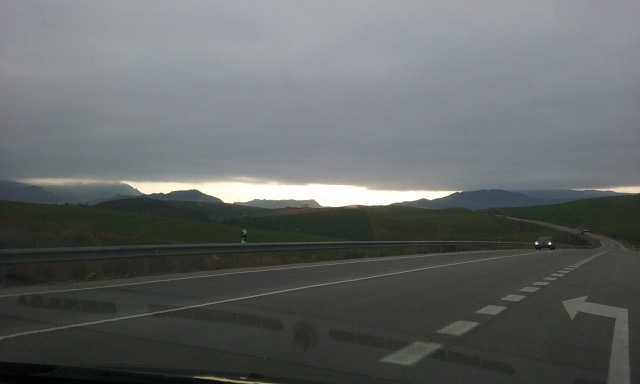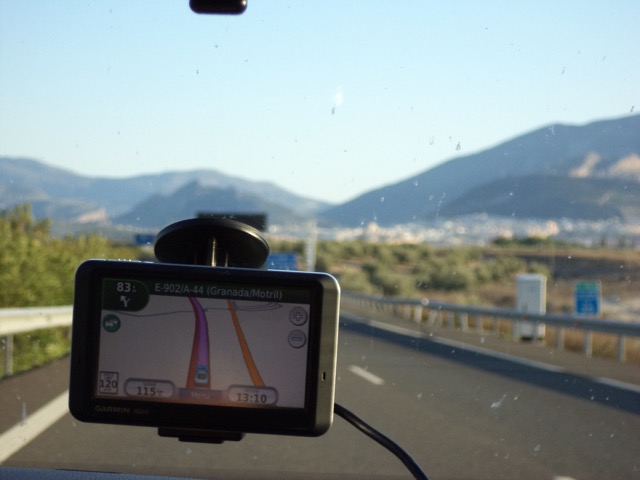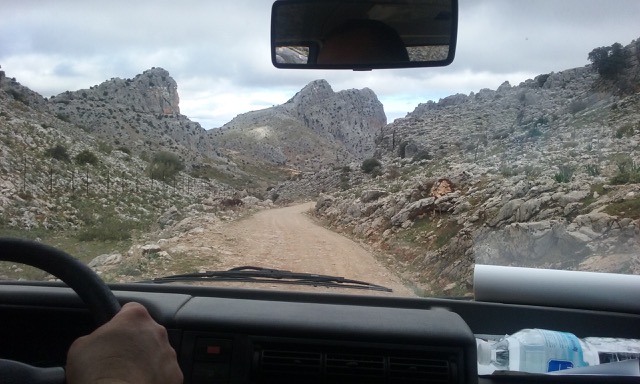
“Are you a good or a bad co-pilot?” was the topic of discussion on Radio Andalucía a while back. I certainly belong to the latter group, having often led my husband astray, sending him left instead of right at some vital road crossing. Indeed, one could say that I am the co-pilot from hell, though I am exceedingly good at distracting the driver by pointing out places of interest, be it a flowering poppy field, colourful laundry hanging from a fifth floor balcony or a cloud formation looking like a loop-sided piglet.
 I have come to the acceptance that I am directionally challenged. This tendency to mix up directions actually has a clinical name. It is called Directional Dyslexia or sometimes Spatial or Geographical Dyslexia. Though not an actual kind of dyslexia, the ‘condition’ is distinguished by right/left confusion, or what my husband would call right/the-other-right confusion, often combined with a tendency to become disoriented or lost. Now, I am not such an extreme case, as I only get lost when I choose to. However, given certain circumstances, lets say if someone was to put a gun to my head and say, “March right!” I would inevitably turn left. Or to ‘the other right’…
I have come to the acceptance that I am directionally challenged. This tendency to mix up directions actually has a clinical name. It is called Directional Dyslexia or sometimes Spatial or Geographical Dyslexia. Though not an actual kind of dyslexia, the ‘condition’ is distinguished by right/left confusion, or what my husband would call right/the-other-right confusion, often combined with a tendency to become disoriented or lost. Now, I am not such an extreme case, as I only get lost when I choose to. However, given certain circumstances, lets say if someone was to put a gun to my head and say, “March right!” I would inevitably turn left. Or to ‘the other right’…
To my great relief, the Andalucian countryside consists mostly of single-lane roads with endless landmarks, so we, the directionally challenged co-pilots or hereafter DCCPs for short, can say ‘Turn in there after the old farm” or “We are taking off here after that nice big crocked olive tree”, thus cleverly omitting the right/left confusion. However there are times when these tactics wont do, particularly when entering the province’s larger cities, such as Sevilla, Granada or Malaga. With increased traffic there are of course more frequent crossings and turnoffs, thus increasing the need for more rapid direction giving and hence decision-making for the co-pilot. Combine this with the Spanish cutthroat drivers and the DCCPs will have a real challenge on their hands.
 The invention of the GPS has helped us GCCPs significantly, especially the later models, with split screen information and multiple warnings. But right is still right and left is still left and NOT ‘the other right’. If someone, that someone usually being my husband, suddenly calls out to me “Do I go right or left???” I will unfortunately not be able to give an instant answer, and certainly not guaranteed the correct one, particularly not if I have been chatting away or had my eyes on a bicycle with a lovely basket at the front, as who would not be distracted by such?
The invention of the GPS has helped us GCCPs significantly, especially the later models, with split screen information and multiple warnings. But right is still right and left is still left and NOT ‘the other right’. If someone, that someone usually being my husband, suddenly calls out to me “Do I go right or left???” I will unfortunately not be able to give an instant answer, and certainly not guaranteed the correct one, particularly not if I have been chatting away or had my eyes on a bicycle with a lovely basket at the front, as who would not be distracted by such?
For many of us GCCPs, the Spanish love for roundabouts can be a saving grace. Glorietas may be a pain in the neck and a magnet for accidents, especially since Spanish drivers rarely use their turn signals and will cut over two lanes of traffic to exit right in front of you without a shudder or an inkling or a ‘sorry’. However, for myself, representing the vast and barely recognized group of GCCPs, there is a trick to be taught. When in doubt, I have learned to say, “Lets go around another time to be sure, shall we?”
 I used to disagree a lot with our old GPS. Initially, we called her la tia (Spanish for aunt), but gradually she became Latifah, after the Queen. I find it much easier to relate to objects when they have a name, and for technical aids like a GPS it feels better to have a name to disagree with. Latifah was imported from Canada and had a dismal Spanish accent. She also had an annoying way of repeating “Recalculating. Recalculating” with a nasal voice whenever I had led us astray, which in the first few months were often, if not always. Thankfully, our new Latifah is much better and do not say anything when I get things wrong. She just quietly finds us another way. Of course, I still manage to get us lost. The other day we were driving back from Sevilla and Latifah had dutifully advised us of the Ronda take off miles ahead of time. I could see from the GPS screen which lane we had to follow, to the right, I mean the real right. Yet, just as we came upon the fork in the row, I called “Go Left” to my husband, while pointing to the right. Thankfully he didn’t crash into the centre island, but took the right turn, justifiably lecturing me of the dangers of having a co-pilot that does not pay attention on the road. It wasn’t that I hadn’t paid any attention. I had actually been staring at Latifah and seen our take off to the right, only in my mind it was left.
I used to disagree a lot with our old GPS. Initially, we called her la tia (Spanish for aunt), but gradually she became Latifah, after the Queen. I find it much easier to relate to objects when they have a name, and for technical aids like a GPS it feels better to have a name to disagree with. Latifah was imported from Canada and had a dismal Spanish accent. She also had an annoying way of repeating “Recalculating. Recalculating” with a nasal voice whenever I had led us astray, which in the first few months were often, if not always. Thankfully, our new Latifah is much better and do not say anything when I get things wrong. She just quietly finds us another way. Of course, I still manage to get us lost. The other day we were driving back from Sevilla and Latifah had dutifully advised us of the Ronda take off miles ahead of time. I could see from the GPS screen which lane we had to follow, to the right, I mean the real right. Yet, just as we came upon the fork in the row, I called “Go Left” to my husband, while pointing to the right. Thankfully he didn’t crash into the centre island, but took the right turn, justifiably lecturing me of the dangers of having a co-pilot that does not pay attention on the road. It wasn’t that I hadn’t paid any attention. I had actually been staring at Latifah and seen our take off to the right, only in my mind it was left.
The only viable way of avoiding that GSSPs confuse GPS directions is to create a GPS that uses the expression ‘the-other-right’ instead of left. We, the GPSSs are here to stay, as pilots and co-pilots on the road. We do not cause intentional confusion; we just have a different way of understanding directions. Personally, it is more a question of distraction than disorientation. I simply favour noticing Medieval towers to looking for road signs. This may lead to, and has led to slight discrepancies with above-mentioned husband and with our most trusted Latifah. Yet even they will have to admit that we have discovered many an interesting place through unwillingly or unknowingly taking the wrong turn.
